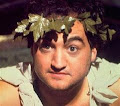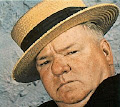Review: The Lost Weekend (1945)
>> Monday, January 29, 2007
 USA/B&W-101 m./Dir: Billy Wilder/Wr: Charles Brackett & Billy Wilder/Cast: Ray Milland (Don Birnam), Jane Wyman (Helen St. James), Howard Da Silva (Nat), Phillip Terry (Wick Birnam), Doris Dowling (Gloria)
USA/B&W-101 m./Dir: Billy Wilder/Wr: Charles Brackett & Billy Wilder/Cast: Ray Milland (Don Birnam), Jane Wyman (Helen St. James), Howard Da Silva (Nat), Phillip Terry (Wick Birnam), Doris Dowling (Gloria)
The Lost Weekend was a gamble. There had never before been a realistic depiction of alcoholism on film. Sure, there had been a few temperance melodramas in the Twenties and Thirties, but none of them had been what anyone would call true-to-life. Otherwise, the movies had relegated booze and boozers to the role of comic relief. The consensus of opinion in Hollywood was that The Lost Weekend was a losing bet. No one thought audiences would want to see a character debase himself due to alcohol addiction, and it was whispered that director Wilder and star Milland were committing career suicide in the attempting such a project. As it turned out, the film garnered four Academy Awards--two for Wilder (Best Director and Screenplay, shared with co-writer Charles Brackett), one for Milland (Best Actor), and one for “Best Picture.” The film documents a four-day weekend in the life of an alcoholic (Milland), as the initially charming inebriate lies, steals, hallucinates, and eventually considers suicide due to his reliance on the bottle. On the whole, it’s dark stuff, but the typically sharp Brackett/Wilder screenplay keeps the proceedings from getting too maudlin (watch for the physical business they give Milland each time he lights a cigarette). The only misstep is the ending, which seems a bit too hopeful in relation to what has come before.
The film documents a four-day weekend in the life of an alcoholic (Milland), as the initially charming inebriate lies, steals, hallucinates, and eventually considers suicide due to his reliance on the bottle. On the whole, it’s dark stuff, but the typically sharp Brackett/Wilder screenplay keeps the proceedings from getting too maudlin (watch for the physical business they give Milland each time he lights a cigarette). The only misstep is the ending, which seems a bit too hopeful in relation to what has come before.
As for Milland, he gives the best performance of his career. Whether the scene requires him to be charming, manipulative, pathetic, or delirious, he hits just the right notes. His portrayal of a souse on the slide is an object lesson in the pitfalls of too much of a good thing.
Drinks Consumed--Rye, gin, and vermouth
Intoxicating Effects--Sneaking sips, slurred speech, stumbling, bar tossed, hangover, the shakes, and delirium tremens Potent Quotables--BIRNAM: You don’t approve of drinking?
Potent Quotables--BIRNAM: You don’t approve of drinking?
NAT: Not the way you drink.
BIRNAM: It shrinks my liver, doesn’t it, Nat? It pickles my kidneys, yes. But what does it do to my mind? It tosses the sandbags overboard so the balloon can soar. Suddenly, I’m above the ordinary. I’m confident, supremely confident. I’m walking a tightrope over Niagra Falls. I’m one of the great ones. I’m Michelangelo molding the beard of Moses. I’m van Gogh painting pure sunlight. I’m Horowitz playing the “Emperor Concerto.” I’m John Barrymore before the movies got him by the throat. I’m Jesse James and his two brothers. All three of them! I’m W. Shakespeare. And out there, it’s not 3rd Avenue any longer. It’s the Nile, Nat, the Nile, and down it floats the barge of Cleopatra.
Video Availability--The Lost Weekend DVD (Universal)
Similarly Sauced Cinema--Ray Milland hit the bottle again in the 1951 melodrama Night Into Morning.





















































.jpg)







